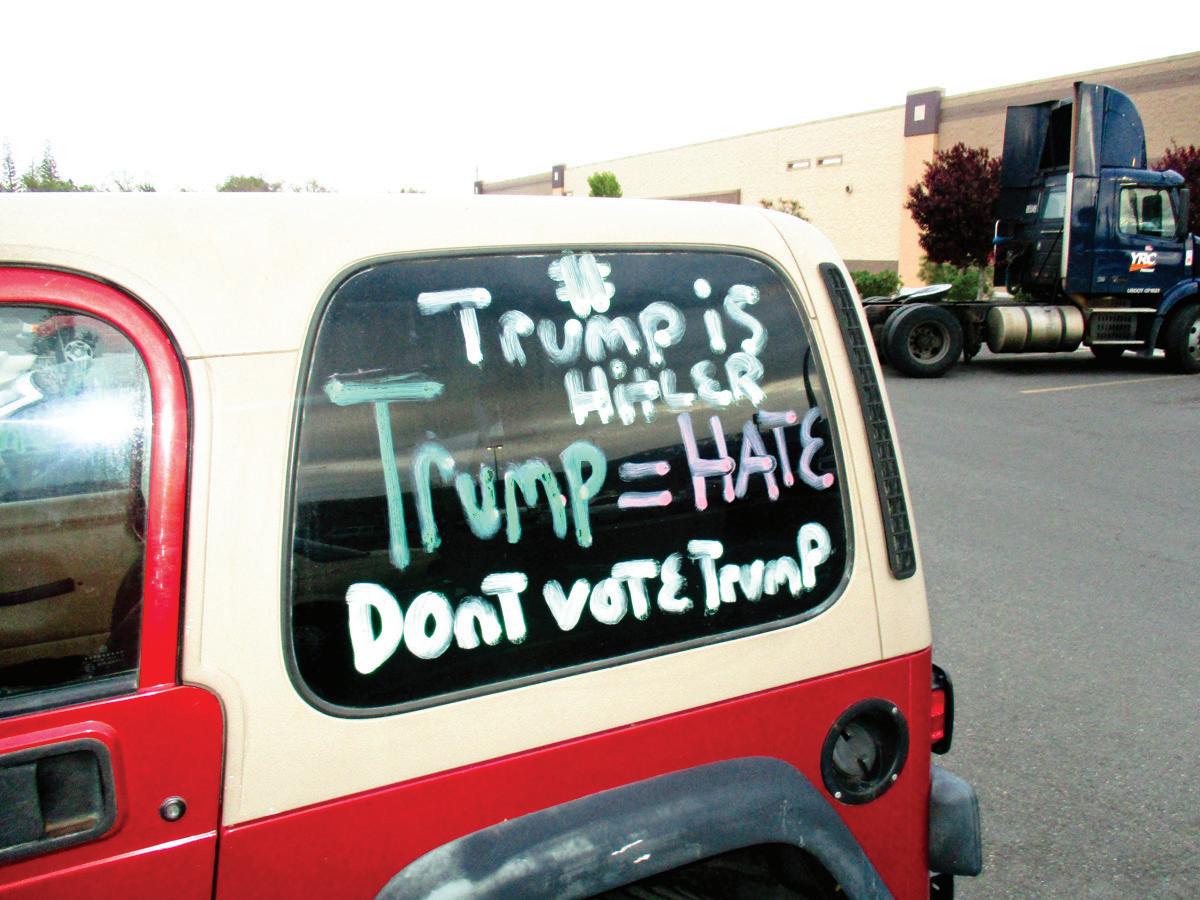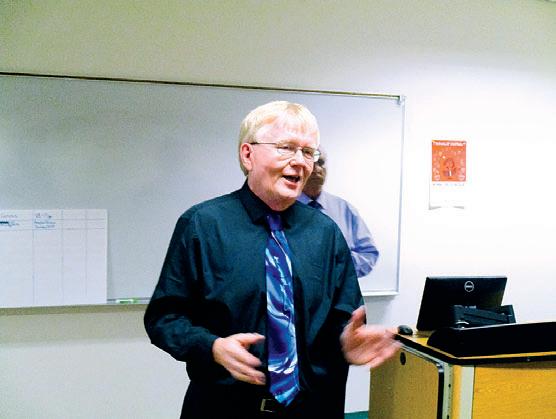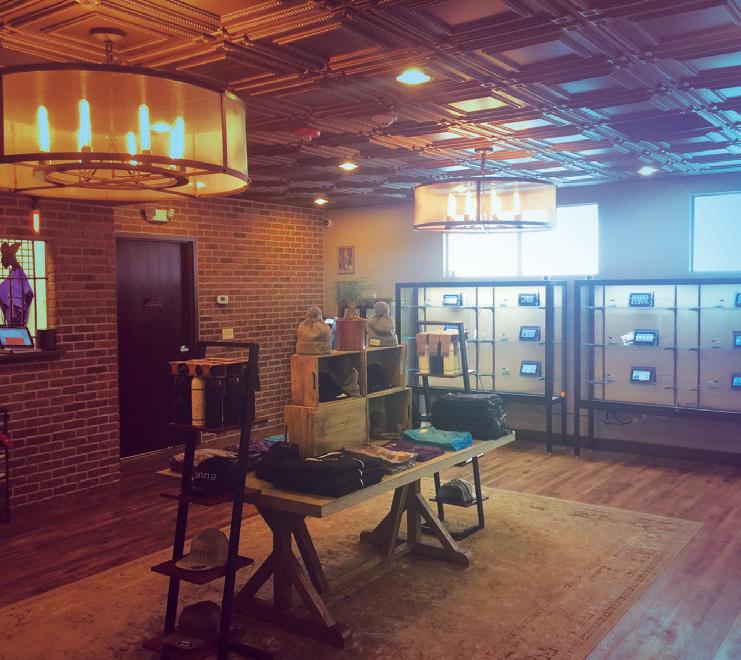
11 minute read
News
from May 19, 2016
BS walks
A commercial outfit called Lincoln Treasury ran a full page ad—designed to look like news—in the May 5 Reno Gazette-Journal to advertise something called U.S. State Silver Bars. These are small troy-ounce bars of silver with the head of a Native American on one side and the name and shape of Nevada on the other.
Advertisement
The Native American is actually taken from the U.S. buffalo nickel (1913-1938), so he’s not from a Nevada tribe. The nickel was designed by sculptor James Earle Fraser, and he said he made the head a composite of a Cheyenne, a Kiowa and a Sioux.
The bars sell for $134 each. The price of silver floats, but it is usually in the two digits range per ounce, so most of the $134 must pay for the recycled art. Silver prices have been rising steadily since the first of April, and some analysts are predicting a sharp rise in silver prices this year, but even the most optimistic predictions are around $55. There are definitely better deals around in coin shops.
Letter still missing
The Washoe County Library’s downtown branch is marking its 50th anniversary. Designed by architect Hewitt Wells and completed in 1966, Wells was reportedly frustrated that he could not design a park around the library, so he put the park inside.
We thought this would be a good time to check if any progress has been made on finding the library’s letter from Lady Bird Johnson. Shortly after the library opened, Johnson—then first lady—sent a letter praising the beauty of the building. The letter was framed and hung on the wall and at some point went missing (“Lost letter,” RN&R, July 27, 2007). No photocopy had been made, so the text of the letter is likewise gone. Library spokesperson Jennifer Oliver said last week the letter has not been located.
In an attempt to at least find the text, we contacted the LBJ Library at the University of Texas in Austin. Archivist Barbara Cline replied, “I have looked in the White House Social Files, the unit that maintained the correspondence for Lady Bird Johnson and her daughters. I found no letter from 1966 addressed to the Washoe County Library or a Reno Library.”
If anyone knows the whereabouts of the letter, they can contact library director Jeff Scott.
Democrats soak up corporate money
As the curtain gets closer to falling on the Obama era, Obama ethics rules are already being loosened up. In February, the Democratic National Committee quietly dropped a prohibition on using corporate money to pay for the Democratic National Convention.
Last week, reports surfaced of the corporations that have lined up to buy favor with the party—for public-spirited reasons, of course— and of the corporate executives who sit on DNC committees. Nevada interests can be involved.
One of particular interest is Ed Rendell, former Democratic governor of Pennsylvania who chairs the host committee for the convention. Rendell is a fracking lobbyist.
Fracking—forcing a water/chemical/sand mix into rock fissures— has been going on in Elko County since 2014, after Gov. Brian Sandoval refused a request from Great Basin Resource Watch and other critics that he block it. “I continue to support hydraulic fracturing, as long as it is done in conjunction with and subject to the review of the Nevada Division of Minerals and Nevada Division of Environmental Protection,” Sandoval said at the time.
Rendell has not been anxious to have his fracking connections known. In March 2003, he wrote a pro-fracking column for the New York Daily News. The editor’s note identified him only as a former Pennsylvania governor. The next day, ProPublica reported that Rendell “has worked as a paid consultant to a private equity firm with investments in the natural gas industry.” The newspaper quickly added language to the online version of the column that said Rendell “is a paid consultant to Element Partners, a private equity firm with stake in a number of energy companies, including hydrofracking/natural gas interests. This information was not disclosed at the time his op-ed was submitted to the News.”
In 2000, Democrats made a fuss about the fact that George W. Bush’s inaugural was paid for in part by corporations seeking influence, such as Enron. A vehicle in a Walmart parking lot in Reno demonstrates Donald Trump’s difficulties on issues of race. Latino voters, once coveted by GOP leaders, make up about a fifth of the Nevada electorate.
Weekend of politics
Nevada conventions display wounds
Both major political parties in Nevada appear likely to go into the general election by Dennis Myers campaign this year badly divided. Hillary Clinton’s forces reclaimed her Nevada caucuses victory last weekend, but ignored the traditional need of winners to kill their opponents with kindness in the process, leaving the Bernie Sanders forces angry and resentful. And the party of Lincoln is having difficulty reconciling itself to the racial views of Donald Trump. Meanwhile, his views on women are deepening his difficulty among Republicans.
Nevada Republican leaders slowly reconcile themselves to Trump.
For one view of the Nevada Democratic Convention, go to https://tinyurl.com/ hxusou2
In the Nevada caucuses in February, Clinton won Clark County (55 to 45 percent) as Sanders took the small counties (52 to 48) and Washoe (54 to 46 percent). Clark contains most of the state’s population.
Sanders then did a better job than Clinton of getting his delegates to the next stage of the process, the county conventions.
It was the third stage, the state Democratic Convention, that held the sharpest potential for serious party divisions. In Nevada, Clark County Democrats and their leaders are known for playing hardball in intraparty politics to an extent not true in Washoe and the small counties, and the state convention was scheduled for Clark’s Paris Las Vegas Hotel.
The good faith of party leaders had already been questioned when the Sanders campaign had to go to court to try unsuccessfully to enforce a state party-issued sheet of “final” deadlines that turned out not to be final and was superseded by new deadlines preventing Sanders people from entering some races.
Clinton’s forces rebounded to get their people to the state convention, scraping out a bare majority. The state party count gave Clinton a 33-delegate advantage out of the 3,400 who attended the convention Saturday—a sharp decline from her caucus win, but enough to control the state convention. Sanders’s campaign said 64 delegates supporting the Vermont senator were improperly denied delegate status, which they loudly protested. Eight Clinton delegates were not seated. The count gave Clinton 20 national convention delegates to 15 for Sanders. Eight unelected delegates, who will go to the national convention by virtue of their public or party offices, mostly favor Clinton, increasing her proportion of the state’s delegation to the Philadelphia convention.
In one fight, a voice vote on rules was challenged with a call for a “division of the house” which was not granted. Some Sanders leaders conceded that some of their delegates were provocative, but said Nevada Democratic chair Roberta Lange was also “contentious.”
Sanders delegates called the procedures “voter suppression.” Paradoxically, Lange had begun the convention saying the contest between Sanders and Clinton had “made us all proud to be Democrats,” which few Sanders delegates would have agreed with by the time the convention ended.
After fights over rules and credentials and election of delegates to the national convention, Lange suddenly gaveled the convention to a close without permission from delegates.
The Nevada Democratic Party later issued a statement claiming that the abrupt end of the convention was necessitated by the hotel insisting that its security could no longer deal with the anger in the hall.
Lange’s hasty departure was reminiscent of a 2008 incident at the Nevada Republican Convention in Reno when, after it became apparent that Ron Paul supporters had taken control of the convention from caucuses winner Mitt Romney, party leaders suddenly adjourned the convention without electing national convention delegates, claiming that the convention contract with the Peppermill Hotel had expired. National convention delegates were later appointed by party leaders.
Following the convention, Clinton people and state Democratic Party officials went into heavy spin mode, filing complaints, demanding apologies, getting their version of the convention out. They won over Rachel Maddow and the New York Times (“From Bernie Sanders Supporters, Death Threats Over Delegates”), which produced reports about violence-laced proceedings caused by the Sanders people. Most reports up to that point had merely referred to “chaos.” Each time an anti-Sanders news report was published or posted, state party publicist Stewart Boss sent it out to news outlets, even though it was the party itself that was the source of most of the post-convention reports—a bit like the Bush/Cheney administration planting stories in the New York Times and then going on Sunday talk shows to respond to them.
In response, Sanders people—new to this game—kept referring people to online videos showing what happened in the hall, posted by Sanders supporter Adryenn Ashley. The party seemed to be winning the spin war, particularly since the Sanders people didn’t realize there was one until fairly late. When Sanders organizer and national convention delegate Carol Cizauskas of Washoe heard about death threats against Lange, she sent her an apology and a message to other
Sanders supporters: “Our revolution is of kindness and love and social justice. If you are resorting to violence or even threats of violence, you are wrong, and you must stop!”
Sanders stood by his Nevada organization, condemning violence but pointing to the peaceful history of his campaign across the country: “Party leaders in Nevada claim that the Sanders campaign has a ‘penchant for violence.’ That is nonsense. Our campaign has held giant rallies all across this country, including in highcrime areas, and there have been zero reports of violence.”
Meanwhile, in Reno, the Republican state convention was newsworthy for its relative peace, and for discussions of how to make Donald Trump competitive in a state where Latinos are a fifth of the electorate and conservatives seem ready to sit on their hands.
Republicans are generally believed to need 30 percent of the Latino vote in presidential races. Ronald Reagan, who believed the GOP could make major inroads with Latinos based on shared values like religion, pushed his total among Latinos up to 37 percent in his 1984 reelection. Few Republicans these days can achieve that. Instead of trying to lure Latinos as Reagan did, many Republican leaders cannot resist the siren song of immigrant-bashing, with the result that their Latino tallies have dropped like a rock across the Sun Belt states. Donald Trump may have accelerated that effort into a crusade, but it was already underway in the GOP.
In Nevada, the state’s Latino governor might be useful to Trump, but Brian Sandoval has always avoided an ethnic identification and failed to carry Latinos in either his election or reelection as governor. Moreover, while Sandoval has endorsed Trump, he’s keeping his distance from the billionaire, not even attending the Republican National Convention in Cleveland where Trump expects to be nominated. (The Nevada convention denounced Sandoval’s commerce tax while calling for school improvements.) Nevada Republican leaders seem, slowly, to be reconciling themselves to Trump. Nevada political analyst Fred Lokken said they have little choice.
Centrists may re-take control of the Nevada GOP by default because the social conservatives are firmly opposed to Trump.
Moreover, Trump’s problems with women voters were exacerbated last weekend by a lengthy New York Times report on his private and public behavior that was widely reprinted— including by the Las Vegas Sun in Nevada’s population center. One source for the story has rejected the ways her comments were portrayed but the sheer volume of the Times’ findings overcame that glitch, much like questions about Bill Cosby began to evaporate after the first couple of dozen women came forward.

Trump responded in his patented so’s-your-mother fashion on Twitter: “The failing @nytimes wrote yet another hit piece on me. All are impressed with how nicely I have treated women, they found nothing. A joke!”
Republican leaders responded with a day of “people just don’t care” comments about Trump’s women problem, but surveys have shown that upward of 70 percent of women voters view him unfavorably. Women make up more than half the electorate, and since 1980 women have always turned out in larger percentages than men.
Trump’s troubles have been helpful to headline writers—“Trump needs to start insulting white dudes” (Chicago Tribune), “Trump’s new strategy against Clinton: Kinder, gentler humiliation” (Washington Post)—but they are serious business for Republicans lower on the ticket. Many Republicans are still faced with the decision of whether to endorse Trump, which could make them look to the public like they are embracing his views—which is the impression a Democratic news release tried to create: “Nevada Senate candidate Congressman Heck endorses Trump and his anti-women, anti-immigrant, anti-worker agenda!” Ω

Clinton scraped up a bare majority at the Nevada Democratic convention.
LOKKEN

Best Medical Marijuana DISPENSARY IN RENO
We Offer The Highest Level Of MedicalGrade Marijuana And The Broadest Selection Of Alternative Health Resources And Educational Assistance
• Premium Marijuana • Locally Grown • Wide Variety of Strains • Delivery Service Available • Open 7 Days A Week
Visit Us Today For a Free Consultation Learn How Nevada Residents And Out-Of-State Customers Can Purchase From Our Dispensary
20% OFF
For New Patients With This Ad!
5398 SUN VALLEY BOULEVARD | SUN VALLEY, NV 89433 Serving Sun Valley, Reno and the Lake Tahoe Region MON-SAT 9AM-7PM | SUNDAY 9AM-5PM 1-775-674-0420 | www.kannareno.com










